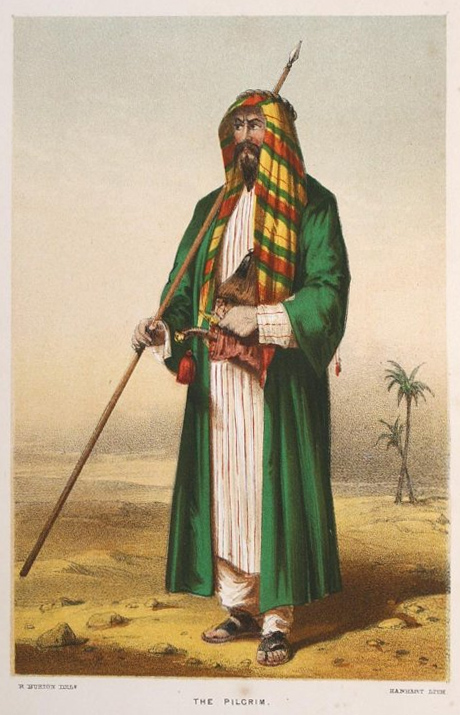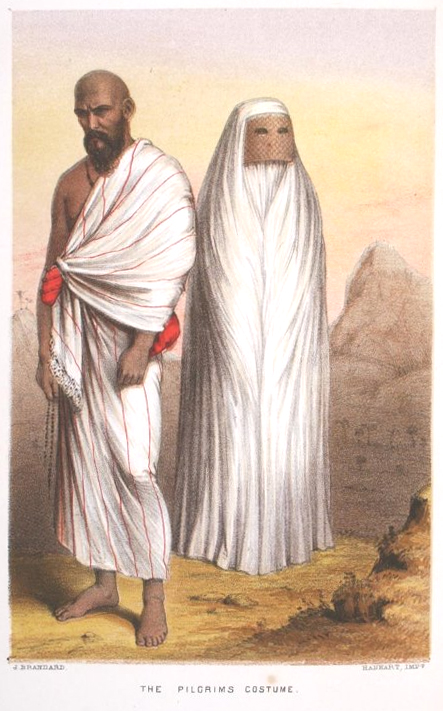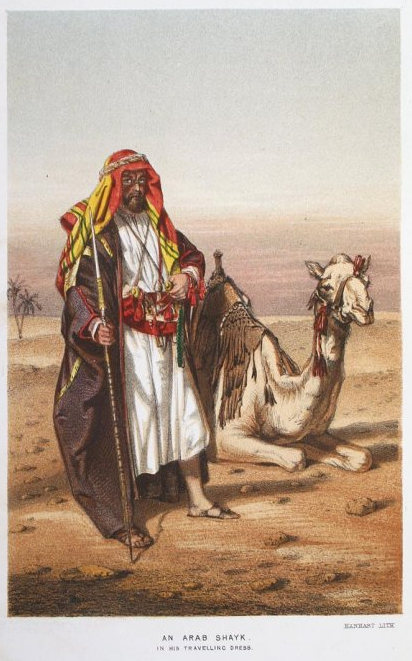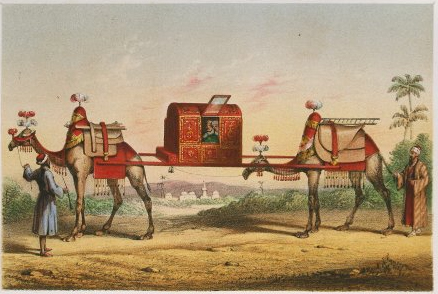Personal Narrative of a Pilgrimage to El-Medinah and Meccah
First edition in three volumes, 1855-6.
London: Longman, Brown, Green, Longmans, and Roberts
Volume 3 not available here yet.
Second Edition in two volumes of 1857.
London: Longman, Brown, Green, Longmans, and Roberts
Third edition in 3 volumes of 1874.
Leipzig: Tauchnitz, 1874
The Copyright Edition.
Volume 3 not available here yet
Third edition (revised) in one volume of 1879.
London: William Mullan and sons, 1879.
Sometimes referred to as the Fourth Edition
Memorial Edition in two volumes of 1893.
London: Tylston and Edwards, 1893.
Widely considered to be the best edition, as it restores material cut from the later editions but incorporates corrections made after the first edition.
HTML transcription from etext.library.adelaide.edu.au.



TO
COLONEL WILLIAM SYKES,
F. R. SOC, M. R. G. SOC, M. R. A. SOC,
AND LORD RECTOR OF THE MARISCHAL COLLEGE,
ABERDEEN.
I do not parade your name, my dear Colonel, in the van of this volume, after the manner of that acute tactician who stuck a Koran upon his lance in order to win a battle. Believe me it is not my object to use your orthodoxy as a cover to my heresies of sentiment and science, in politics, political economy and what not? But whatever I have done on this occasion, if I have done any thing, has been by the assistance of a host of friends, amongst whom you were ever the foremost. And the highest privilege I aim at is this opportunity of publicly acknowledging the multitude of obligations owed to you and to them. Accept, my dear Colonel, this humble return for your kindness, and ever believe me, The sincerest of your well wishers, RICHARD F. BURTON.

PREFACE TO THE FIRST EDITION.
The interest just now felt in everything that relates to the East would alone be sufficient to ensure to the author of “El Medinah and Meccah” the favourable consideration of the Reading Public. But when it is borne in mind that since the days of William Pitts of Exeter (A.D. 1678-1688) no European travellers, with the exception of Burckhardt* and Lieut. Burton,+ have been able to send us back an account of their travels there, it cannot be doubted but that the present work will be hailed as a welcome addition to our knowledge of these hitherto mysterious penetralia of Mohammedan superstition. In fact, El Madinah may be considered almost a virgin theme; for as Burckhardt was prostrated by sickness throughout the period of his stay in the Northern Hejaz, he was not able to describe it as satisfactorily or minutely as he did the Southern country, — he could not send a plan of the Mosque, or correct the popular but erroneous ideas which prevail concerning it and the surrounding city.
The reader may question the propriety of introducing in a work of description, anecdotes which may appear open to the charge of triviality. The author’s object, however, seems to be to illustrate the peculiarities of the people — to dramatise, as it were, the dry journal of a journey, — and to preserve the tone of the adventures, together with that local colouring in which mainly consists “l’education d’un voyage.” For the same reason, the prayers of the “Visitation” ceremony have been translated at length, despite the danger of inducing tedium; they are an essential part of the subject, and cannot be omitted, nor be represented by “specimens.”
The extent of the Appendix requires some explanation. Few but literati are aware of the existence of Lodovico Bartema’s naive recital, of the quaint narrative of Jos. Pitts, or of the wild journal of Giovanni Finati. Such extracts have been now made from these writers that the general reader can become acquainted with the adventures and opinions of the different travellers who have visited El Hejaz during a space of 350 years. Thus, with the second volume of Burckhardt’s Travels in Arabia, the geographer, curious concerning this portion of the Moslem’s Holy Land, possesses all that has as yet been written upon the subject.
The editor, to whom the author in his absence has intrusted his work, had hoped to have completed it by the simultaneous publication of the third volume, containing the pilgrimage to Meccah. The delay, however, in the arrival from India of this portion of the MS. has been such as to induce him at once to publish El Misr and El Medinah. The concluding volume on Meccah is now in the hands of the publisher, and will appear in the Autumn of the present year. Meanwhile the Public will not lose sight of the subject of Arabia. Part of El Hejaz has lately been inspected by M. Charles Didier, an eminent name in French literature, and by the Abbe Hamilton, — persuaded, it is believed, by our author to visit Taif and Wady Laymum. Though entirely unconnected with the subjects of Meccah and El Medinah, the account of the Sherif’s Court where these gentlemen were received with distinction, and of the almost unknown regions about Jebel Kora, will doubtless be welcomed by the Orientalists and Geographers of Europe.
Mr. Burton is already known by his “History of Sindh.” And as if to mark their sense of the spirit of observation and daring evinced by him when in that country, and still more during his late journeyings in Arabia and East Africa, the Geographical Society, through their learned Secretary, Dr. Norton Shaw, have given valuable aid to this work in its progress through the press, supplying maps where necessary to complete the illustrations supplied by the author, — who, it will be perceived, is himself no mean draughtsman.
It was during a residence of many years in India that Mr. Burton had fitted himself for his late undertaking, by acquiring, through his peculiar aptitude for such studies, a thorough acquaintance with various dialects of Arabia and Persia; and, indeed, his Eastern cast of features (vide Frontispiece, Vol. II.) seemed already to point him out as the very person of all others best suited for an expedition like that described in the following pages.
It will be observed that in writing Arabic, Hindoostannee, Persian, or Turkish words, the author has generally adopted the system proposed by Sir William Jones and modified by later Orientalists. But when a word (like Fatihah for Fat-hah) has been “stamped” by general popular use, the conversational form has been preferred; and the same, too, may be said of the common corruptions, Cairo, Kadi, &c., which, in any other form, would appear to us pedantic and ridiculous. Still, in the absence of the author, it must be expected that some trifling errors and inaccuraci[e]s will have here and there have crept in. In justice to others and himself, the Editor, however, feels bound to acknowledge, with much gratitude, that where such or even greater mistakes have been avoided, it has been mainly due to the continued kindness of an Eastern scholar of more than European reputation, — who has assisted in revising the sheets before finally consigning them to the printer.
Let us hope that the proofs now furnished of untiring energy and capacity for observation and research by our author, as well as his ability to bear fatigue and exposure to the most inclement climate, will induce the Governments of this country and of India to provide him with men and means (evidently all that is required for the purpose) to pursue his adventurous and useful career in other countries equally difficult of access, and, if possible, of still greater interest, than the Eastern shores of the Red Sea.
THOMAS L. WOLLEY.
Hampton Court Palace,
June, 1855.
* In 1811.
+ Captain Sadlier is not mentioned, as his Frankish dress prevented his entering the city.
PREFACE TO THE THIRD EDITION.
AFTER a lapse of twenty-five years, a third edition of my Pilgrimage has been called for by the public, to whom I take this opportunity of returning thanks. Messrs. Mullan have chosen the very best opportunity. My two publications concerning the Khedival Expeditions to Midian ("The Gold Mines of Midian," and "The Land of Midian Revisited"), are, as I have stated in the Preface, sequels and continuations of this Pilgrimage from which the adventures forming their subject may be said to date.
The text has been carefully revised, and the "baggage of notes" has been materially lightened.1 From the Appendix I have removed matter which, though useful to the student, is of scant general interest. The quaint and interesting "Narrative and Voyages of Ludovicus Vertomannus, Gentleman of Rome," need no longer be read in extracts, when the whole has been printed by the Hakluyt Society. (The Travels of Ludovico di Varthema in Egypt, Syria, Arabia Deserta and Arabia Felix, in Persia, India, and Ethiopia, A.D. 1503 to 1508. Translated from the original Italian edition of 1510, with a Preface by John Winter Jones, Esq., F.S.A., and edited, with notes and an Introduction, by George Percy Badger, late Government Chaplain in the Presidency of Bombay. London.) On the other hand, I have inserted after the Appendix, with the permission of the author, two highly interesting communications from Dr. Aloys Sprenger, the well-known Orientalist and Arabist, concerning the routes of the Great Caravans. My friend supports his suspicions that an error of direction has been made, and geographers will enjoy the benefit of his conscientious studies, topographical and linguistic.
The truculent attacks made upon pilgrims and Dar- wayshes call for a few words of notice. Even that learned and amiable philanthropist, the late Dr. John Wilson of Bombay ("Lands of the Bible," vol. ii., p. 302) alludes, in the case of the Spaniard Badia, alias Ali Bey al-Abbasi, to the "unjustifiable fanciful disguise of a Mohammedan Pilgrim." The author of the Ruddy Goose Theory ("Voice of Israel from Mount Sinai") and compiler of the "Historical Geography of Arabia" has dealt a foul blow to the memory of Burckhardt, the energetic and inoffensive Swiss traveller, whose name has ever been held in the highest repute. And now the " Government Chaplain " indites (Introduction, p. xxvii.) the following invidious remarks touching the travels of Ludovico di Varthema the vir Deo carus, be it remarked, of the learned and laical Julius Caesar Scaliger: "
This is not the place to discuss the morality of an act involving the deliberate and voluntary denial of what a man holds to be truth in a matter so sacred as that of Religion. Such a violation of conscience is not justifiable by the end which the renegade (!) may have in view, however abstractedly praiseworthy it may be; and even granting that his demerit should be gauged by the amount of knowledge which he possesses of what is true and what false, the conclusion is inevitable, that nothing short of utter ignorance of the precepts of his faith, or a conscientious disbelief in them, can fairly relieve the Christian, who conforms to Islamism without a corresponding persuasion of its verity, of the deserved odium all honest men attach to apostasy and hypocrisy." The reply to this tirade is simply, "Judge not; especially when you are ignorant of the case which you are judging." Perhaps also the writer may ask himself, Is it right for those to cast stones who dwell in a tenement not devoid of fragility ?
The second attack proceeds from a place whence no man would reasonably have expected it. The author of the " Narrative of a Year's Journey through Central and Eastern Arabia" (vol. i., pp. 258-59) thus expresses his opinions:- "
Passing oneself off for a wandering Darweesh, as some European explorers have attempted to do in the East, is for more reasons than one a very bad plan. It is unnecessary to dilate on that moral aspect of the proceeding which will always first strike unsophisticated minds. To feign a religion which the adventurer himself does not believe, to perform with scrupulous exactitude, as of the highest and holiest import, practices which he inwardly ridicules, and which he intends on his return to hold up to the ridicule of others, to turn for weeks and months together the most sacred and awful bearings of man towards his Creator into a deliberate and truthless mummery, not to mention other and yet darker touches, all this seems hardly compatible with the character of a European gentleman, let alone that of a Christian." This comes admirably a propos from a traveller who, born a Protestant, of Jewish descent, placed himself "in connection with," in plain words took the vows of, "the order of the Jesuits," an order "well-known in the annals of philanthropic daring"; a popular preacher who de claimed openly at Bayrut and elsewhere against his own nation, till the proceedings of a certain Father Michael Cohen were made the subject of an official report by Mr. Consul-General Moore (Bayrut, November n, 1857); an Englishman by birth who accepted French protection, a secret mission, and the "liberality of the present Emperor of the French"; a military officer travelling in the garb of what he calls a native (Syrian) "quack" with a comrade who "by a slight but necessary fiction passed for his brother-in-law"; a gentleman who by return to Protestantism violated his vows, and a traveller who was proved by the experiment of Colonel (now Sir Lewis) Pelly to have brought upon himself all the perils and adventures that have caused his charming work to be considered so little worthy of trust. Truly such attack argues a sublime daring. It is the principle of "vieille coquette, nouvelle devote"; it is Satan preaching against Sin. Both writers certainly lack the "giftie" to see themselves as others see them.
In noticing these extracts my object is not to defend myself: I recognize no man's right to interfere between a human being and his conscience. But what is there, I would ask, in the Moslem Pilgrimage so offensive to Christians? what makes it a subject of "inward ridicule"? Do they not also venerate Abraham, the Father of the Faithful ? Did not Locke, and even greater names, hold Mohammedans to be heterodox Christians, in fact Arians who, till the end of the fourth century, represented the mass of North-European Christianity? Did Mr. Lane never conform by praying at a Mosque in Cairo? did he ever fear to confess it ? has he been called an apostate for so doing? Did not Father Michael Cohen prove himself an excellent Moslem at Wahhabi-land.
The fact is, there are honest men who hold that Al- Islam, in its capital tenets, approaches much nearer to the faith of Jesus than do the Pauline and Athanasian modifications which, in this our day, have divided the Indo- European mind into Catholic and Roman, Greek and Russian, Lutheran and Anglican. The disciples of Dr. Daniel Schenkel'sschool ("A Sketch of the Character of Jesus," Longmans, 1869) will indeed find little difficulty in making this admission. Practically, a visit after Arab Meccah to Angle-Indian Aden, with its " priests after the order of Melchisedeck," suggested to me that the Moslem may be more tolerant, more enlightened, more charitable, than many societies of self-styled Christians. And why rage so furiously against the " disguise of a wandering Darwaysh?" In what point is the Darwaysh more a mummer or in what does he show more of betise than the quack ? Is the Darwaysh anything but an Oriental Freemason, and are Freemasons less Christians because they pray with Moslems and profess their belief in simple unitarianism ?
I have said. And now to conclude. After my return to Europe, many inquired if I was not the only living European who has found his way to the Head Quarters of the Moslem Faith. I may answer in the affirmative, so far, at least, that when entering the penetralia of Moslem life my Eastern origin was never questioned, and my position was never what cagots would describe as in loco apostatce. On the other hand, any Jew, Christian, or Pagan, after declaring before the Kazi and the Police Authorities at Cairo, or even at Damascus, that he embraces Al-Islam, may perform, without fear of the so-called Mosaic institution, "Al-Sunnah," his pilgrimage in all safety. It might be dangerous to travel down the Desert- line between Meccah and Al-Madinah during times of popular excitement; but the coast route is always safe. To the "new Moslem," however, the old Moslem is rarely well affected; and the former, as a rule, returns home unpleasantly impressed by his experiences.
The Eastern world moves slowly--eppur si muove. Half a generation ago steamers were first started to Jeddah: now we hear of a projected railroad from that port to Meccah, the shareholders being all Moslems. And the example of Jerusalem encourages us to hope that long before the end of the century a visit to Meccah will not be more difficult than a trip to Hebron. Ziyadeh hadd-i-adab!
RICHARD F. BURTON.
London, 31st March, 1879.